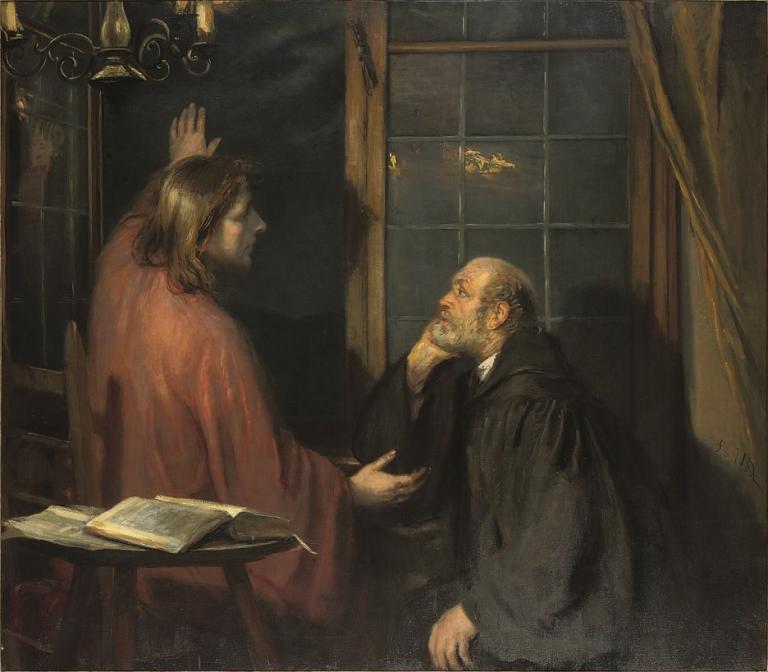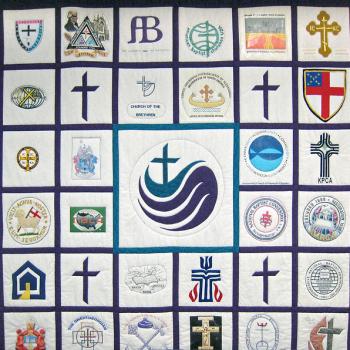In the course of our excellent Bible study of Job–I never realized how evangelical, how focused on justification, that book is–we went down a side road on Bible translation. Pastor Moerbe had us look at John 3:3, in which Jesus tells Nicodemus that no one can see the kingdom of God without being “born again.” The word in Greek is ánōthen (ἄνωθεν.)
The word derives from ánō (ἄνω), meaning “above.” It literally and most usually means “from above,” as in describing the view from a mountain. But it can also mean “again.” (See this discussion from Strong’s and other Biblical Greek lexicons.)
So which is it? You must be “born again,” or you must be “born from above”? Many evangelicals stress the necessity of a “born again experience,” whereas Lutherans, Calvinists, and others stress that God’s action brings us into faith. How should the passage be translated?
I was aware of the controversy, but I didn’t notice how the context shows both meanings. Consider how the passage in John 3 unfolds:
3 Now there was a man of the Pharisees named Nicodemus, a ruler of the Jews.2 This man came to Jesus by night and said to him, “Rabbi, we know that you are a teacher come from God, for no one can do these signs that you do unless God is with him.” 3 Jesus answered him, “Truly, truly, I say to you, unless one is born again [ἄνωθεν] he cannot see the kingdom of God.”
Nicodemus interprets the word in the sense of “again”:
4 Nicodemus said to him, “How can a man be born when he is old? Can he enter a second time into his mother’s womb and be born?”
Jesus responds, using the word in the sense of “from above”:
5 Jesus answered, “Truly, truly, I say to you, unless one is born of water and the Spirit, he cannot enter the kingdom of God. 6 That which is born of the flesh is flesh, and that which is born of the Spirit is spirit. 7 Do not marvel that I said to you, ‘You must be born again.’ 8 The wind blows where it wishes, and you hear its sound, but you do not know where it comes from or where it goes. So it is with everyone who is born of the Spirit.”
This is not an ambiguity. The word in Greek carries both meanings. Nicodemus picks up on one of the meanings, then Jesus draws out the other.
An English translation, though, since it lacks a word that includes both senses, chooses one or the other. I would think that the meaning intended by Jesus should win out, though then we would miss Nicodemus’s puzzlement.
Go here for how the various English translations handle the verse. The most accurate renditions are probably the ones that combine both senses: “born again from above” (Contemporary Jewish Bible, Jubilee Bible); “reborn from above” (Amplified Bible). Luther, interestingly, renders it “jemand von neuem geboren werde,” which means “again,” but not so much in the sense of another time (“nochmal,” or “wieder”) but in the sense of “newly.”)
This also shows the importance of pastors, who are charged with explaining and preaching the text, knowing the original languages.
Does this same double meaning apply in Aramaic, which Jesus is assumed to have spoken, or did Jesus also speak Greek? Mark Ward gives quite a bit of evidence that Jesus, along with other first century Jews–including the common folk–did speak Greek, at least sometimes. For example, 68% of inscriptions, from tombs to synagogues, are in Greek. Galilee, where Jesus was from, had a strong presence of Hellenistic, Greek-speaking Jews. Even its normal Aramaic dialect was quite different from that of Jerusalem, so a conversation between Jesus and a member of the Sanhedrin may well have been in Greek.
At any rate, the inspired text that we have is in Greek, so this is what we must go by.
We must be born again, but the way this happens is to be born from above, by the work of the Holy Spirit. Specifically, one must be “born of water and the Spirit,” which gets us into the theology of Baptism.
Illustration: “Christus und Nikodemus” (ca.1886), by Fritz von Uhde – 1. Hans Rosenhagen; Uhde: des Meisters Gemälde Stuttgart, 1908. Deutsche Verlags-Anstalt, p. 1812./3. Unknown4. Christie’s, LotFinder: entry 5168602, Public Domain, https://commons.wikimedia.org/w/index.php?curid=33841831
For more works by the 19th century Lutheran artist Fritz von Uhde and discussions of how he expresses his theology in his art, see this, this, and this.
HT: Rev. Ned Moerbe


















